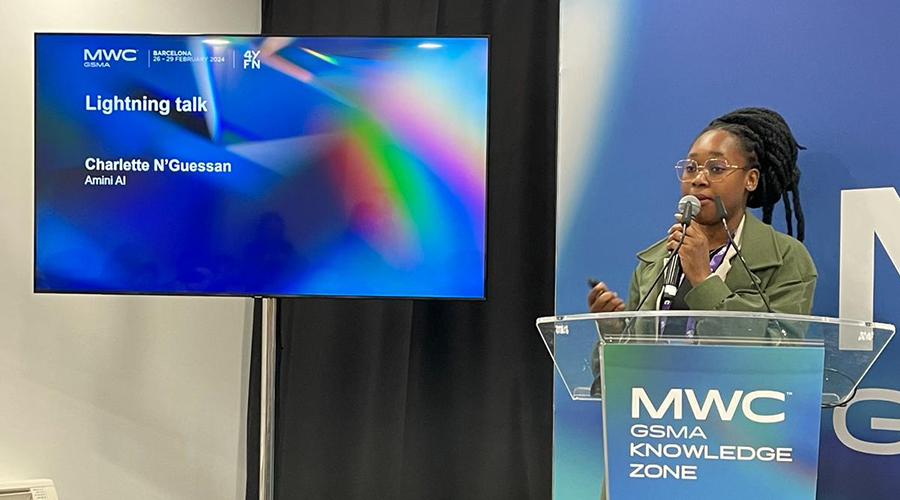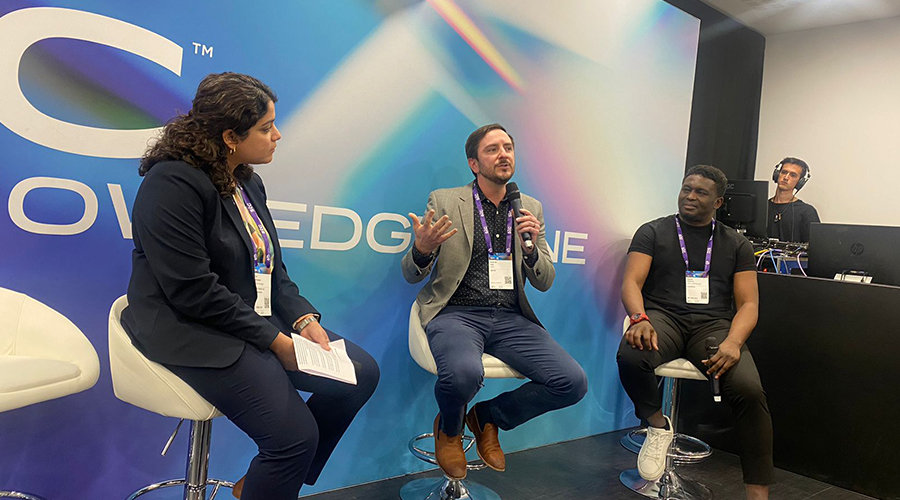Artificial Intelligence (AI) shows strong potential to accelerate progress towards achieving the sustainable development goals. Advances in generative AI and AI tools have been met with a growing interest from funders and innovators looking to leverage AI for impact.
At Mobile World Congress Barcelona (MWC) 2024, the GSMA Mobile for Development’s Central Insights Unit convened a group of tech-for-good innovators, funders and ecosystem builders with the objective of sharing learnings and experiences on building AI solutions and on shifting to AI-centric business models. We also discussed key priorities to support a more inclusive and equitable AI ecosystem in low-and-middle-income countries (LMICs).
Tech start-ups are leveraging AI in different ways, as ‘builders’ as well as ‘users’
In LMICs, tech-for-good businesses that are looking to leverage AI face barriers such as lack of high-quality data, lack of access to digital infrastructure and computing capacity, as well as inadequate availability of technically skilled workers. Amini AI is an example of a start-up that is looking to bridge the environmental data gap in Africa.
The start-up has an AI-powered data platform that integrates satellite imagery data, existing earth data sources and sector-specific data to provide customised data dashboards to its B2B clients, which include governments, financial institutions and private companies such as food processors and cosmetics manufacturers, among others.
At our session, Amini’s Charlette N’guessan discussed how Amini’s clients use their data solution to benefit smallholder farmers and local communities who are part of their value chain. Amini’s solution has gained considerable interest in the market since it launched in 2022. The start-up closed a seed funding round of $4 million in November last year, led by Salesforce Ventures and the Female Founders Fund. Amini is now looking to partner with other players in the ecosystem to expand its portfolio of clients and move into the next stage of growth.

While several impact-driven AI-first start-ups are emerging in LMICs, we are also seeing development organisations looking to integrate AI into their ongoing tech4d work. This is the case with Digital Green, a social enterprise working in India and Africa that provides farm advisory services to smallholder farmers through informative videos delivered by agricultural extension agents.
Digital Green recently launched a Chat-GPT based AI chatbot dubbed farmer.chat in India, Ethiopia and Kenya, in partnership with Gooey.ai, a generative AI start-up. In our session, Beryl Agengo from Digital Green discussed how AI has enabled the company to rapidly scale their extension agent training model by facilitating real-time communication between smallholder farmers, extension agents and governments through channels like Telegram and WhatsApp. While still in pilot stage, farmer.chat has proved an important tool to support agriculture extension agents with their field outreach, helping them to deliver agriculture advisory to smallholder farmers at scale. The generative AI assistant has potential to bring considerable impact across all markets but especially in large ones, such as India where the extension agent to farmer ratio is 1:650.
Tech-for-good start-ups are transitioning to AI-centred models
As AI models are becoming more accessible and their applications more sophisticated, established tech-for-good start-ups are also integrating AI into their solutions. AI has been a driver for such companies to sustainably scale their solutions while expanding their geographical footprint.
Ignitia, a provider of hyper local weather and climate intelligence to smallholder farmers is an example of a tech company that has recently shifted to a more AI-centric business model. At the session, Andrew Lala, Ignitia’s CEO, described how the start-up has leveraged AI to enter new markets in Southeast Asia and South America. AI is helping them identify common patterns between the weather models of different geographies and enabling them to replicate the solution more easily.

Ignitia is also leveraging AI to expand in a cost-effective way, with predictive models that rely not just on historical weather data (the efficacy of which has reduced with the unpredictable impacts of climate change), but also on more recent data and micro-climatic data at a hyper-local scale, allowing it to provide more accurate, local level forecasts. An AI-centric approach is enabling Ignitia to offer newer types of forecasts (for different agricultural value chains, logistics and transportation), by reducing the cost of developing them.
Koolboks, a solar-powered refrigeration and energy company has brought in a different approach to integrating AI in their solution. Launched in 2018 in Nigeria, the company tackles the issue of lack of consistent energy supply and food wastage through their solar-powered freezers. Koolboks works primarily with informal businesses and addresses issues such as affordability and accessibility by offering an IoT-powered pay-as-you-go (PAYG) mechanism.
AI has been integrated with the solution at the “back-end”, where it enables the creation of credit scores for customers, predictive maintenance of the refrigerators and early-detection of payment defaults. Having access to this information allows Koolboks to take timely interventions like assigning agents to visit customers about payment delays or refrigerator maintenance and developing more detailed customer profiles. While Koolboks’s use of AI as a tool is still in its nascent stages, the company plans to continue exploring how AI can create value for them as they expand their presence to other countries in Africa.
Long-term funding and technical assistance as key barriers to scale
At the session, Ignitia and Koolboks highlighted some key areas of support they require as they scale their use of AI and related tools. Funding was one such area, and both the start-ups highlighted its importance in overcoming barriers such as the cost and availability of high-quality data and access to AI compute and infrastructure. While the African start-up market is in its early stages with a potential for growth, funding for start-ups in Africa fell by 28% in 2023, compared to the year before.
Multilateral organisations and donors recognise the importance of long-term and sustainable funding with the intention of supporting AI innovators not only in getting their solution off the ground, but also in enabling scale, as businesses enter the next stages of growth. This was highlighted by Calum Handforth from the UNDP, who mentioned as an example Timbuktoo, a catalytic initiative to support the start-up ecosystem in Africa in the form of funding and business support. Launched by the UNDP in early 2024, the initiative has pledged USD 1 billion support to the start-up ecosystem in Africa.
As the adoption of AI among start-ups is rapidly increasing, it is important to also consider that AI may not always be the best solution. Lily Steele from Global Innovation Fund, an impact investor operating in Africa and Asia, emphasised the importance of start-ups understanding the problem at hand before adopting AI tools.

The speakers discussed how start-ups, or even established tech for good companies, may feel like they need to incorporate AI, regardless of its value add, to respond to expectations from funders. However, given the high costs of integrating AI tools, it is important for start-ups to realistically think about how they can contribute to the solution before investing in them.
This point is compounded by the experience of Mozilla Foundation, represented at MWC by Koliwe Majama who highlighted the importance of acknowledging the risk associated with investing in AI from the funders’ perspective as well. One of the ways to address this risk is for funders to ensure that they understand the ground realities of the geographies they invest in, as well as the needs of the end users of their investees, to account for any potential negative impacts of deploying AI tools.
Along with funding, an important factor for AI-enabled innovations to grow is access to technical assistance. Technical assistance could be in the form of training on big data, global regulations around AI and data sharing, and business and commercialisation support, among others. Start-ups and tech companies can receive this support from a variety of actors. Technical assistance is often provided from funders, through incubators and accelerators, from Big Tech players as part of collaborative projects and from international development organisations. An example of this is GIZ’s Fair Forward Initiative, that has partnered with IBM and Ghana Tech Lab to launch the Africa AI Accelerator to provide product and business development support to start-ups. Another example is Google’s AI-first start-up accelerator operating across Asia, Africa and South America.
Collaboration is the way forward
The session speakers all concurred that multi-stakeholder partnerships with a shared vision are the need of the hour to progress on the AI for development agenda. In this early phase, it is crucial for philanthropic organisations that are providing resources to de-risk disruptive innovations to join forces and act in synergy, avoiding duplication of efforts.

Other actors with a key role to play include governments, Big Tech players, civil society organisations and research and academic institutions. An example of such a partnership is the Artificial Intelligence for Development Africa initiative, led by Canada’s International Development Research Centre (IDRC) and Sweden’s government agency for development agency (SIDA) with an objective to build innovation research networks, support policy research and enhance AI talent in Africa.
Technology-driven, private-private partnerships, such as those between technology start-ups and mobile network operators (MNOs), are another key element to enable AI innovation at scale. As an example, both Ignitia and Koolboks hold long-standing partnerships with different MNOs. In West Africa, they both work with Orange, leveraging the MNO’s delivery channels. Ignitia offers SMS-based weather forecasts to smallholder farmers, while customers of Koolboks can use Orange’s mobile money services to pay for their refrigerators in small instalments. Another example of a private-private partnership is that of Reliance Industries and Nvidia in India, who are working to create AI infrastructure by building a supercomputer and providing access to AI cloud supercomputing, to significantly enhance India’s AI compute capacity.
Enabling policies to build robust AI ecosystem
As the AI ecosystems in African countries are growing and maturing, the creation of effective national AI strategies policies has become a priority. Countries like Rwanda have taken a lead by launching its AI policy, and other countries working towards this include Nigeria, Kenya and Sri Lanka. An important consideration highlighted during our session was the importance of LMICs taking the lead and setting the agenda of their own priorities and objectives in the regulation of AI. There could be a tendency to rely on established policy frameworks from developed countries, which may operate in different contexts (e.g. data, skills and compute) availability and with different priorities.
Speakers also emphasised that the process of policymaking for AI must be participatory and include perspectives from stakeholders like start-ups, tech companies and civil societies, as well as the end users of AI solutions, especially local communities, to ensure that their rights are protected by AI policies and strategies. Initiatives like the African Observatory on Responsible Artificial Intelligence are working with local partners to contribute to the development of legislative and policy frameworks that include responsible, ethical and trustworthy AI.
The Central Insights Unit is funded by the UK Foreign, Commonwealth & Development Office (FCDO) and supported by the GSMA and its members.




